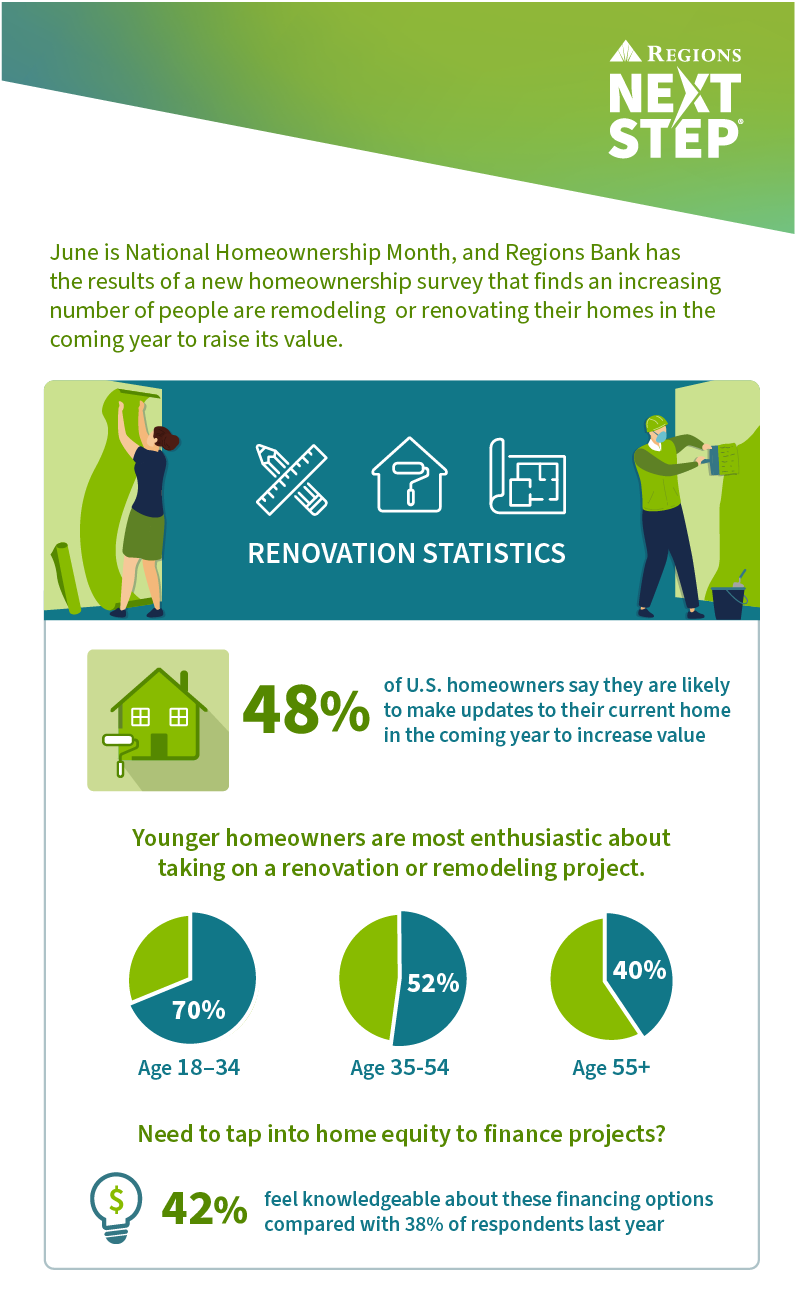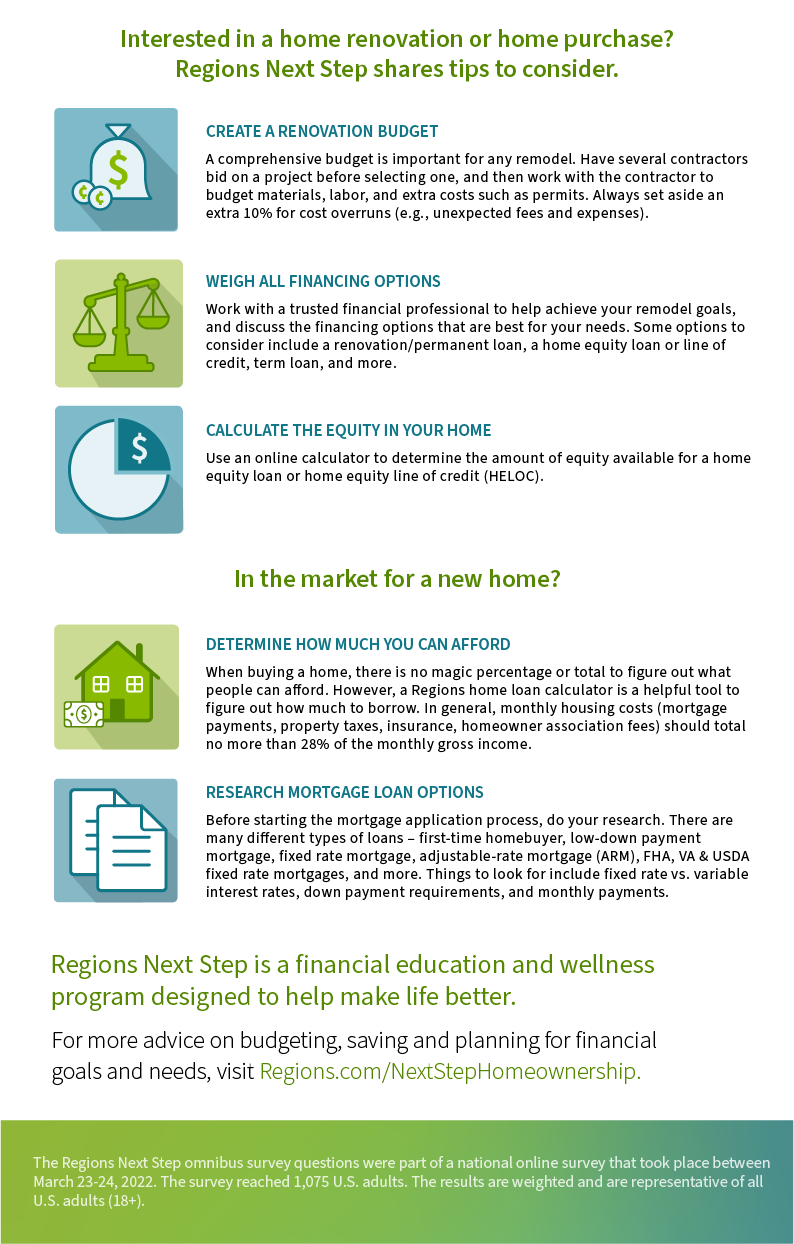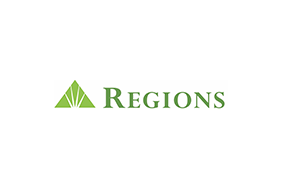[ad_1]
Published 06-08-22
Submitted by Regions Bank

BIRMINGHAM, Ala., June 8, 2022 /CSRwire/ – Regions Bank on Wednesday announced the results of a new homeownership survey that finds an increasing number of people are remodeling their homes in an effort to raise its value. This comes as the homebuying market remains very competitive, with some people choosing to upgrade their current homes rather than look for a new house.
June is National Homeownership Month, and the survey was conducted by Regions Next Step, the bank’s no-cost financial education program that serves people of all ages, regardless of whether they bank with Regions. According to the survey, almost half (48%) of U.S. homeowners say they are likely to make updates to their current home in an effort to increase its value in the coming year. This figure is up seven percent compared to this time last year.
Additionally, younger homeowners are most enthusiastic about taking on a renovation or remodeling project. Seventy percent of those between the ages of 18 and 34 are likely to make updates compared with 52% of those ages 35-54 and 40% of those ages 55+.
As Americans increasingly renovate their homes, understanding how to tap into home equity to finance projects is on the rise. According to the survey, 42% feel knowledgeable about these financing options compared with 38% of respondents who felt in the know about using their home’s equity last year.
“Even in a competitive housing market, people still have a lot of options, including using their home’s equity to support a renovation or expansion of their current home,” said Michelle Walters, head of Mortgage Production at Regions Bank. “Our mortgage and branch-banking teams work with homeowners one-on-one to talk about their options and create a financial roadmap toward achieving their goals. Whether it’s a renovation – or a new home purchase – we find that it pays to consult with a financial professional and identify the choices that are best for your needs.”
Additional key findings of the survey include:
- Renters are looking to the future; almost one in three (30%) plan to buy a home in the next 12 months.
- Finances are the biggest barriers to homeownership. Thirty-one percent cited finding an affordable home and another 31% noted saving enough money for a down payment as the biggest financial barriers. Of respondents aged 18-34, 41% cited finding an affordable home and 39% noted saving enough money for a down payment as their top barriers.
- Forty-five percent of Americans feel knowledgeable about the overall homebuying process. They also feel more knowledgeable about conventional mortgages (45%) than government backed mortgages (36%) or first-time homebuyer programs (30%).
As part of National Homeownership Month, Regions Bank is highlighting free resources that are available year-round to help homeowners and homebuyers understand and navigate the intricacies of owning a home. This includes a series of new homeownership courses available in the expanded Next Step library of resources. These courses explore the different types of loans and mortgages, mortgage relief options, helpful tips on establishing and maintaining strong credit, and the importance of credit to your overall financial health.
“As people plan for and create dream homes, picking out new appliances and decorating may be the easiest part of the process. Choosing the right financing options to help make their vision a reality can be a bit more delicate to navigate,” said Joye Hehn, Next Step financial education manager for Regions. “Regions is committed to providing free tools and resources that can help guide homebuyers and homeowners through the financial decisions that fit their needs and goals.”
Self-paced Next Step courses are accessible via a mobile device, tablet or desktop computer. Additionally, as part of Regions’ Weekly Webinar Series, people can register for an upcoming session of ‘Your Road to Homeownership,’ which dives into the risks, responsibilities and rewards that come with homeownership. The full schedule is available here, and new dates are added regularly.

Regions Next Step recommends the following for people who are considering a renovation or remodel:
- Create a Renovation Budget: Having a comprehensive budget is important for any remodel. Have several contractors bid on a project before selecting one, and then work with the contractor to budget materials, labor, and extra costs such as permits. Always set aside an extra 10% for cost overruns (e.g., unexpected fees and expenses).
- Weigh all Financing Options: Work with a trusted financial professional to help achieve your remodel goals, and discuss the financing options that are best for your needs. Some options to consider include a renovation/permanent loan, a home equity loan or line of credit, term loan, and more.
- Calculate the Equity In Your Home: Use an online calculator to determine the amount of equity available for a home equity loan or home equity line of credit (HELOC).
For those who are in the market for a new home, Regions Next Step recommends the following:
- Determine How Much You Can Afford: When buying a home, there is no magic percentage or total to figure out what people can afford. However, a Regions home loan calculator is a helpful tool to figure out how much to borrow. In general, monthly housing costs (mortgage payments, property taxes, insurance, homeowner association fees) should total no more than 28% of the monthly gross income.
- Research Mortgage Loan Options: Before starting the mortgage application process, do your There are many different types of loans – first-time homebuyer, low-down payment mortgage, fixed rate mortgage, adjustable-rate mortgage (ARM), FHA, VA & USDA fixed rate mortgages, and more. Things to look for include fixed rate vs. variable interest rates, down payment requirements, and monthly payments.
For more, visit Regions.com/NextStepHomeownership.
The Regions Next Step omnibus survey questions were part of a national online survey that took place between March 23-24, 2022. The survey reached 1,075 U.S. adults. The results are weighted and are representative of all U.S. adults (18+).
About Regions Financial Corporation
Regions Financial Corporation (NYSE:RF), with $164 billion in assets, is a member of the S&P 500 Index and is one of the nation’s largest full-service providers of consumer and commercial banking, wealth management, and mortgage products and services. Regions serves customers across the South, Midwest and Texas, and through its subsidiary, Regions Bank, operates approximately 1,300 banking offices and more than 2,000 ATMs. Regions Bank is an Equal Housing Lender and Member FDIC. Additional information about Regions and its full line of products and services can be found at www.regions.com.
About Regions Next Step®
Regions Next Step is the financial education program from Regions Bank, offering a free collection of action-oriented tips, tools and resources. Next Step is designed to simplify financial topics, help people of all ages and business of varying sizes stay on track and meet financial goals. Resources are available online, in-person, virtually, and in English and Spanish. In 2021, Next Step provided financial education to more than 1.4 million people across the company’s footprint, delivered approximately 124,000 financial wellness workshops, received 2.4 million financial education content page views and associates completed 7,000 financial education volunteer hours. Additional information and resources are available at Regions.com/NextStep.

Regions Bank
Regions Bank
Regions Financial Corporation (NYSE:RF), with $147 billion in assets, is a member of the S&P 500 Index and is one of the nation’s largest full-service providers of consumer and commercial banking, wealth management, and mortgage products and services. Regions serves customers across the South, Midwest and Texas , and through its subsidiary, Regions Bank, operates more than 1,300 banking offices and 2,000 ATMs. Regions Bank is an Equal Housing Lender and Member FDIC. Additional information about Regions and its full line of products and services can be found at www.regions.com.
More from Regions Bank
[ad_2]
Source link
